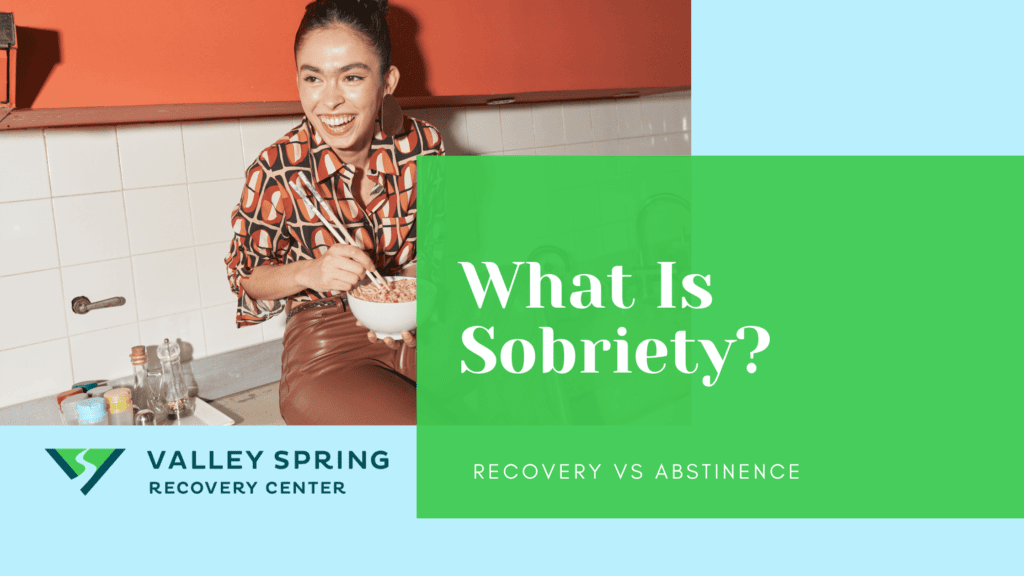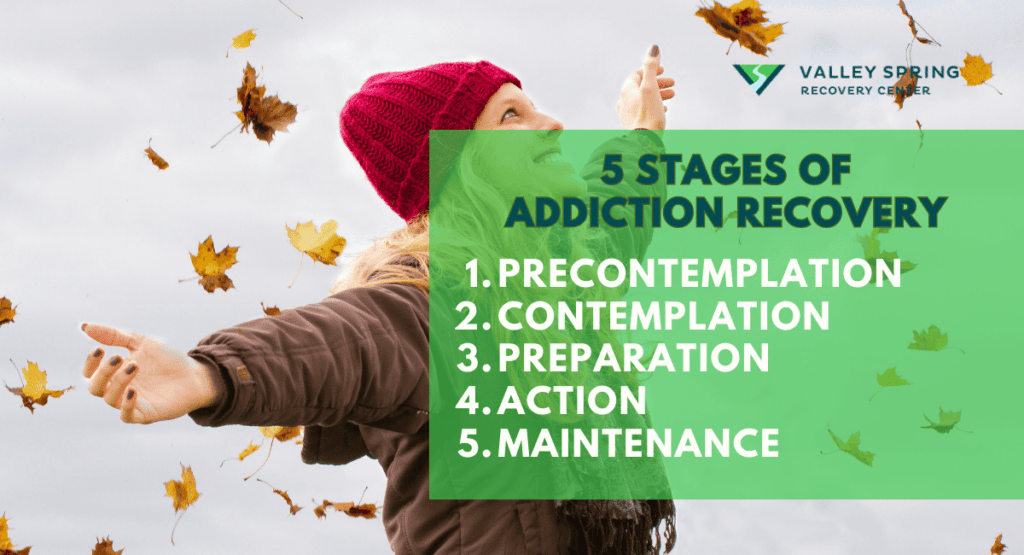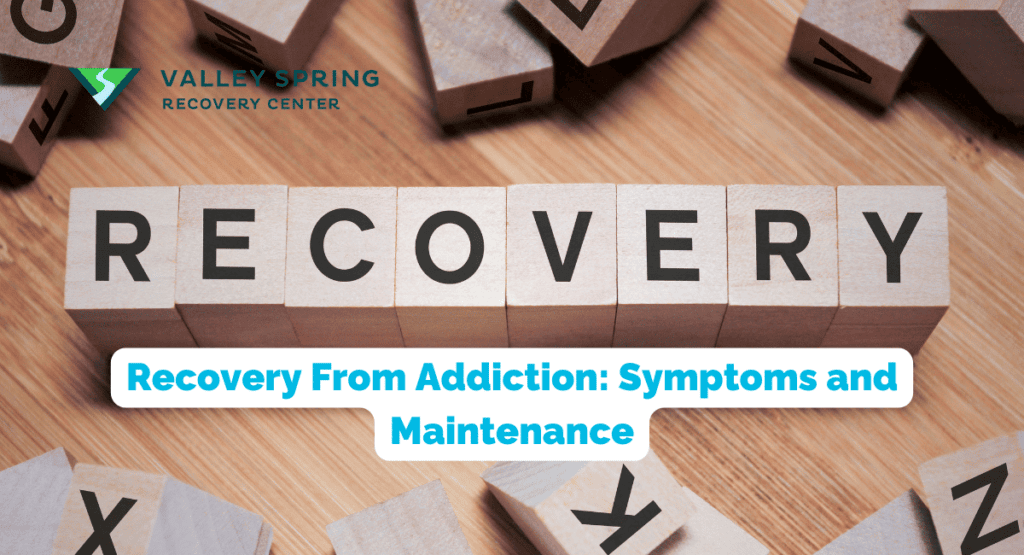Sobriety and abstinence are terms frequently encountered in discussions about addiction recovery and mental well-being. While often used interchangeably, each carries distinct implications that extend beyond the mere absence of substance use. Sobriety encompasses a broader commitment to actions and behaviors that support overall health, whereas abstinence focuses solely on the cessation of substance use.
The complexities of sobriety involve not just physical well-being but also psychological and social aspects that contribute to a holistic approach to recovery. Abstinence, on the other hand, serves as a foundational step in the journey to sobriety but lacks the comprehensive nature of the latter.
Factors such as treatment adherence, personal commitment, and support systems play a significant role in achieving and maintaining sobriety. These elements go beyond the scope of abstinence, which is primarily concerned with avoiding substance use.
The distinction between sobriety and abstinence has practical implications for individuals in recovery, affecting treatment plans, coping strategies, and long-term outcomes. Understanding these nuances is crucial for anyone navigating the path of recovery.
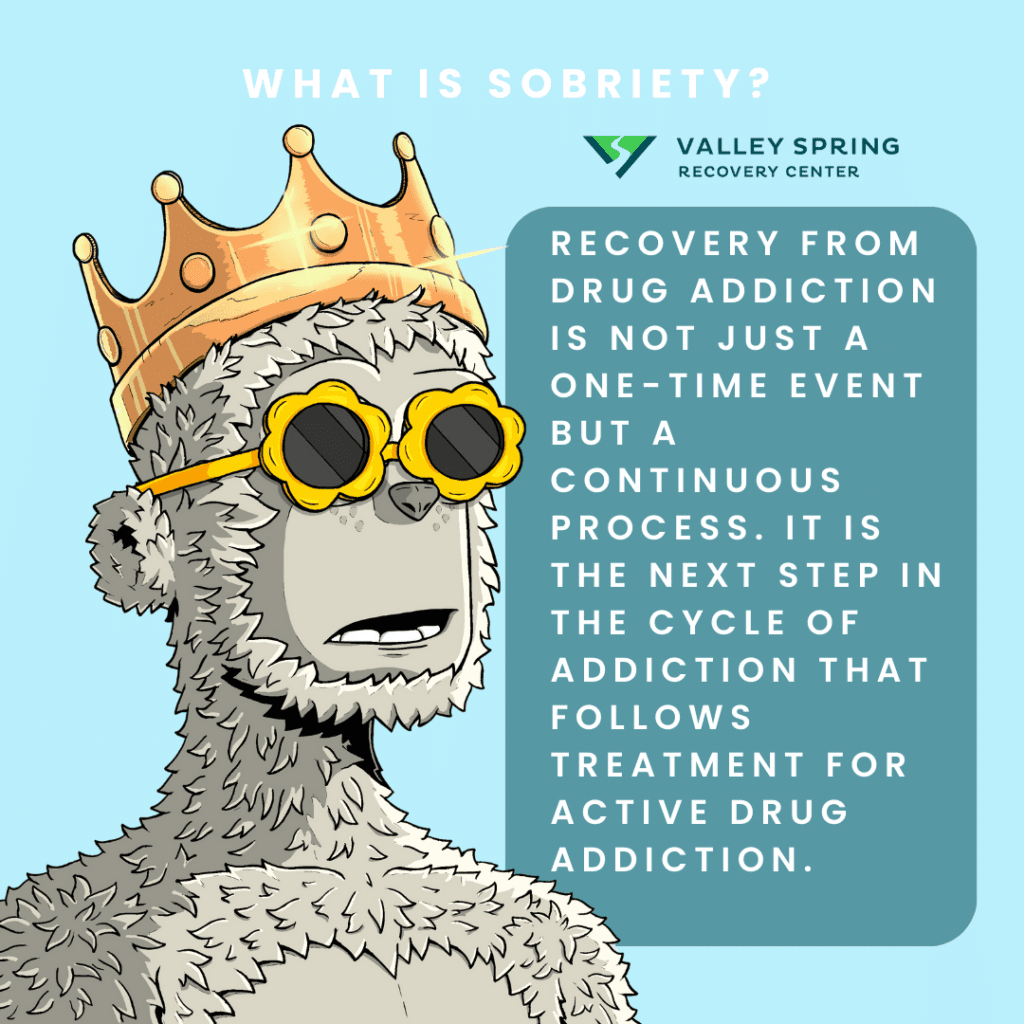
What is Sobriety?
Sobriety is the act of Recovery from drug addiction which represents the process of achieving and maintaining a state of sobriety, which involves not only a drug-free lifestyle but also the restoration of physical and mental well-being, and the rebuilding of one’s life after active drug addiction. Sobriety in this context is an active, ongoing commitment to a set of behaviors and actions that support overall health and prevent relapse, making it an integral part of the recovery journey.
Recovery from drug addiction is not just a one-time event but a continuous process. It is the next step in the cycle of addiction that follows treatment for active drug addiction.
What is Abstinence?
Abstinence is the complete cessation or avoidance of the substance or behavior to which one is addicted. This means not partaking in the addictive substance (like drugs or alcohol) or engaging in the addictive behavior (such as gambling or binge eating) at all. Abstinence is often the initial step in addiction recovery programs and is considered a necessary condition for the treatment of many forms of addiction.
However, it’s important to note that abstinence is not synonymous with recovery or sobriety. While abstinence focuses solely on the absence of the addictive substance or behavior, recovery and sobriety encompass a broader range of actions and commitments. These include not only abstaining from substance use but also engaging in a holistic approach to recovery that addresses physical, psychological, and social well-being. In this sense, sobriety is an active, ongoing commitment to a set of behaviors and actions that support overall health and prevent relapse.
What Does It Mean to Be Sober Vs Abstinent?
Many people use the terms “sobriety” and “abstinence” interchangeably, but they are not the same. Abstinence refers to the cessation of drug or alcohol use, while sobriety is a comprehensive term that represents the previously addicted individual taking steps to holistically maintain their abstinence and quality of life from an emotional, physical, and mental perspective.
Recovery from drug addiction is the process of achieving and maintaining a state of sobriety, which involves not only a drug-free lifestyle but also the restoration of physical and mental well-being, and the rebuilding of one’s life after active drug addiction. Sobriety in this context is an active, ongoing commitment to a set of behaviors and actions that support overall health and prevent relapse, making it an integral part of the recovery journey.
Can Someone Be Considered Sober If They Use Medication-Assisted Treatment (MAT)?
Yes, individuals using Medication-Assisted Treatment (MAT) can be considered sober. MAT is a legitimate medical treatment for addiction, involving medications that help manage cravings and withdrawal symptoms. Sobriety with MAT is about using these medications responsibly as part of a comprehensive treatment plan.
What’s the Difference Between Dry Drunk Syndrome and Sobriety?
Dry drunk syndrome refers to a condition where an individual is abstinent but still exhibits behaviors and attitudes associated with addiction, such as anger, resentment, or emotional volatility. Sobriety, on the other hand, involves a more profound change in behavior and mindset, striving for personal growth and emotional stability.
What Are The Three Pillars of Recovery and Sobriety?
Recovery is more than just the absence of drug use. It involves action and maintenance of a care plan that addresses three key aspects:
- Physical Well-being: Detoxification and ongoing medical care to restore physical health.
- Psychological Health: Therapy and counseling to address underlying issues.
- Social Support: Building a support system to sustain long-term sobriety.
By focusing on these three pillars, individuals can establish a state of sobriety where they are not only drug-free but also engaged in personal growth and healthy coping mechanisms.
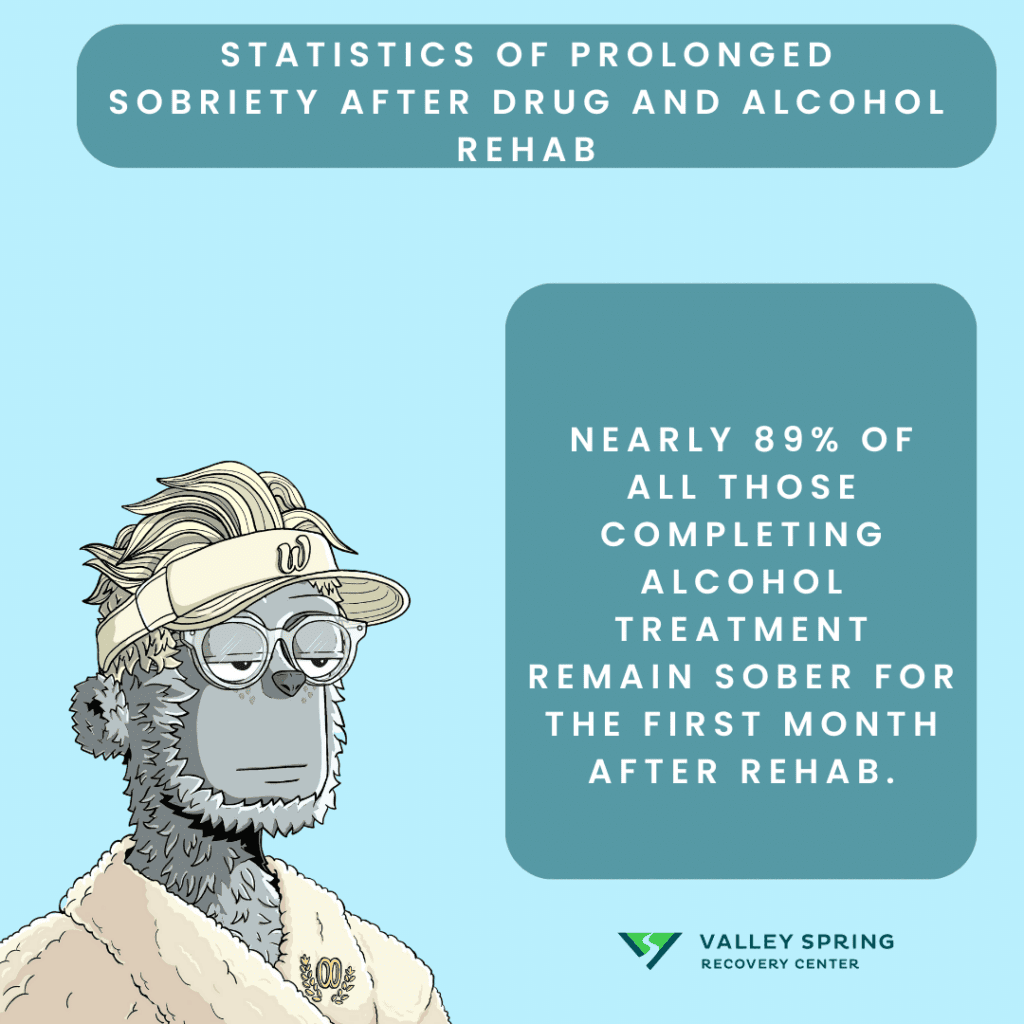
What Are The Chances Of Achieving Sobriety With The Chronic Nature of Addiction After Attending Drug and Alcohol Rehab?
The percentages of individuals who remain sober after attending treatment vary based on provider and drug of choice, however, according to research from the Butler Center for Research at Hazelden Betty Ford Foundation, nearly 89% of all those completing alcohol treatment remain sober for the first month after rehab. Other studies suggest that roughly 50% of individuals who complete addiction treatment programs remain abstinent for a year, and this number increases with time and ongoing treatment.
The American Society of Addiction Medicine (ASAM) states that remission from addiction where an individual is not at a greater risk of developing an addiction than a normal person takes 5 years to achieve.
Sobriety, therefore, is an ongoing commitment to a set of actions and behaviors that prevent relapse. If an individual is willing and open to continual treatment and work on themselves then achieving sobriety is possible. Recognizing addiction as a medical condition can remove the stigma and open doors to evidence-based treatments that are proven to be effective in helping addicts achieve long-term sobriety. Since addiction is a chronic relapsing disease, treatment is not always effective and successful immediately.
What Are The Factors That Influence the Chances of Achieving Sobriety?
The factors that influence sobriety are listed below:
- Treatment Protocol: The effectiveness of the treatment plan, including medication, therapy, and support, plays a significant role.
- Personal Commitment: Sobriety is not a passive state but an active commitment to a set of behaviors and actions that support overall health.
- Support System: A strong support system, including family, friends, and healthcare providers, can significantly increase the chances of maintaining sobriety.
- Coping Mechanisms: Developing healthy coping mechanisms to deal with stress and triggers can make a significant difference.
- Time: The longer an individual stays in recovery, the better they become at managing the symptoms and triggers, thereby increasing the chances of long-term sobriety.
How Can Relapse be Prevented Once Sobriety Has been Achieved?
Preventing relapse involves a multi-pronged approach:
- Follow Treatment Plans: Stick to your medication and therapy schedules.
- Build a Support System: Surround yourself with people who support your recovery.
- Identify Triggers: Know what situations, feelings, or people make you more likely to use them again and develop strategies to cope.
- Stay Committed: Sobriety is an ongoing process that requires constant vigilance and commitment otherwise it is likely for a former addict to start down the path to relapse.
What Are The Best Tips For Staying Sober?
Helpful tips for staying sober, as identified in scientific research, include participating in Alcoholics Anonymous (AA) and Twelve-Step Facilitation (TSF) programs. A comprehensive analysis published in Cochrane Library and also Stanford Medicine indicates that AA and TSF programs, especially when clinically delivered and manualized, are effective in achieving higher rates of continuous abstinence compared to other treatments like cognitive behavioral therapy. The research indicates that 42% of participants in AA remain completely abstinent one year later, higher than the rate for those receiving other types of treatments. Additionally, these programs not only help in reducing drinking intensity and the severity of addiction but also have been shown to lower healthcare costs significantly and therefore are some of the most helpful tips for staying sober.
Can You Be Sober and Still Have Addictive Behaviors?
Being sober generally means abstaining from substances that cause intoxication, but it’s possible to be sober yet still engage in addictive behaviors. Sobriety often involves a deeper journey beyond mere abstinence, addressing underlying issues and patterns of behavior. It’s about cultivating a lifestyle that supports wellness and avoids any form of addiction, whether to substances or behaviors like gambling or overeating.
How Does Emotional Sobriety Fit Into the Picture?
Emotional sobriety is a crucial aspect of the recovery process. It refers to the ability to experience, understand, and effectively manage emotions without resorting to substance use. Emotional sobriety involves developing coping mechanisms and emotional resilience, allowing individuals to handle life’s ups and downs in a healthy, balanced way.
Is It Possible to Be Sober Without Joining a Recovery Program?
Yes, it’s possible to achieve sobriety without formal recovery programs. Some individuals find success through self-help, support from friends and family, or alternative therapies. However, recovery programs can provide valuable structure, support, and resources that many find essential in maintaining long-term sobriety.
What Role Does Mindfulness Play in Sobriety?
Mindfulness is a powerful tool in maintaining sobriety. It involves being fully present and aware of one’s thoughts, feelings, and surroundings without judgment. Mindfulness can help individuals recognize and cope with triggers, reduce stress, and enhance emotional regulation, all of which are vital in sustaining sobriety.
How Does One’s Social Life Change When Transitioning from Abstinence to Sobriety?
Transitioning to sobriety often involves significant changes in social life. This can mean distancing from people or places associated with past substance use and seeking out new, supportive social circles. Sobriety encourages forming relationships that are healthy, positive, and conducive to maintaining a sober lifestyle.
Is There a Difference in Physical Health Between Being Sober and Being Abstinent?
Physical health can improve in both sobriety and abstinence, but sobriety often involves a more comprehensive approach to health. This includes not just abstaining from substances but also adopting healthier lifestyle choices like regular exercise, balanced nutrition, and stress management.
How Do Sobriety and Abstinence Affect Mental Health Differently?
While both sobriety and abstinence can positively impact mental health, sobriety often involves a deeper engagement with mental health issues. It includes actively working on emotional well-being, seeking therapy or counseling, and developing coping strategies for mental health challenges. Abstinence may not necessarily involve this level of mental health engagement.
How Do Relapse Prevention Strategies Differ Between Sobriety and Abstinence?
Relapse prevention in sobriety often involves a holistic approach, addressing both physical and emotional well-being. It includes strategies like therapy, support groups, and lifestyle changes. In contrast, abstinence-focused relapse prevention may concentrate more on avoiding the substance itself, without necessarily addressing the broader lifestyle and emotional aspects.
Ben Fisher
All author postsShare This Post

